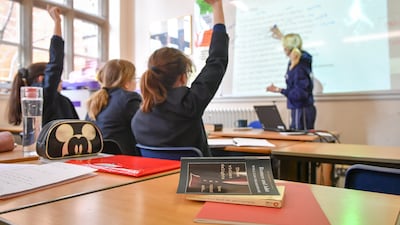Private schools are imposing an increase in fees of up to 8 per cent for the next academic year, ahead of the expected addition of a sales tax if Labour wins the next general election, as wealth advisers say grandparents are dipping into their investment portfolios to help fund the rising costs.
Labour Party leader Keir Starmer has vowed to impose VAT on independent fees to raise money he says will be used to address the “appalling state” of state schools.
A poll involving a dozen independent schools for The Times found annual increases for the academic year beginning in September range from 3.8 per cent to 8 per cent, with an average rise of 5.5 per cent. The latest UK inflation rate was 3.2 per cent in March.
Schools at the top end of the scale include James Allen’s Girls’ School in south London, which will increase its fees by 8 per cent to £24,543 ($30,740) and South Hampstead High School, part of the Girls' Day School Trust network, which will raise its fees by 7.5 per cent to £24,474.
The National understands some private schools have also started updating their terms and conditions to ensure fees and charges are "exclusive" of taxes, further increasing the financial burden on parents.
Schools have said they are concerned about the imposition of VAT on fees and have increasingly developed new strategies to mitigate the impact, such as recruiting pupils from abroad and allowing parents to pay for fees years in advance ahead of the introduction of the VAT charge.
Wealth advisers say parents are also investigating how to help manage the rising fees, which experts say have jumped by more than 20 per cent in three years, with VAT set to double this increase again.
A recent survey of 2,000 people with investable assets of more than £250,000 by wealth manager Saltus predicts that about 21 per cent, of parents will have to remove their children from private school as a result of the rising costs.
Gianpaolo Mantini, a chartered financial planner and partner with the firm, told The National VAT was a "frequent subject of conversation" among its clients, who are taking out loans, moving house and even turning to grandparents to help them with the finances.
The problem, he said, mainly affects the "aspirational squeezed middle", who have already been hit by the failure to reform income tax bands.
"Those who have the wealth tend to be those approaching or in retirement," he said. "And so my client average age is 59. But I will often be dealing with both the children and the parents, so the grandparents in this situation. So we are having conversations at both grandparent and parent level about how these things are going to be funded.
"Grandparents are often the ones who say 'we want to help out. How can we do it?'"
Choices involve making financial and lifestyle compromises, and bringing forward plans for inheritance and financial gifts, "which isn't necessarily a bad thing", Mr Mantini said.
Most expensive UK boarding schools – in pictures
Maxwell Marlow, director of research at free-market think tank the Adam Smith Institute, said it was "unsurprising that concerned grandparents are helping parents to release equity for their grandchildren’s education".
He told The National: "This will help to reduce student migration to the state sector but only for a lucky few. Schools will raise fees in response to the proposed VAT policy and thus students will move or pay more. A more rigorous cost-benefit analysis must be undertaken by those who are proposing this questionable idea."
The institute recently released a report, which found that applying VAT to independent fees may raise no money at all – and could even end up costing the government £1.6 billion.
The policy is expected to result in a reduction of private school rolls but the schools themselves say they do not yet know how many children will be withdrawn as a result.
Estimates vary. The London-based Institute for Fiscal Studies (IFS) predicts the policy could result in a reduction of only 3 to 7 per cent of pupils.
The Adam Smith report called the IFS estimate “highly optimistic”, saying its research shows there is a reasonable chance "many more" children will have to move into the state school system.
It warned the policy is likely to result in state schools being “even more overwhelmed”, leading to the loss of teaching and support staff jobs, while intensifying competition for the country’s best state and grammar schools and driving up local house prices near these schools.
The report highlighted that in 2015, Greece applied a 23 per cent VAT charge on independent school fees, which led to similar problems the Adam Smith Institute is now forecasting for the UK.
Mr Marlow, author of the report Short Term Thinking: Analysing the effect of applying VAT to school fees, told The National: "The only real-world case study of applying VAT to private schools is Greece.
"The result of a 23 per cent tax on private school fees resulted in 'general mayhem', with smaller schools shutting and pressure building up on state schools."
The Independent Schools Council told The National it had tried to talk to Labour about the potential negative impacts of the sales tax but had been unsuccessful.
In a statement issued to The National, Julie Robinson, the council's chief executive, said: “We know a lot of head teachers are worried about the effect a tax on education would have on schools, families and communities.
“In particular, we would really welcome the chance to talk to Labour about our concerns around the impact their policy would have on special educational needs and disabilities support, faith education, military families and care-experienced children.
"We do not know what will happen if VAT is levied on British independent schools but policymakers should exercise caution and take into account the unintended consequences.”










